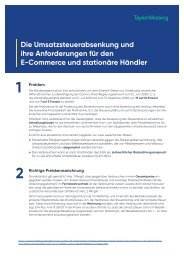Taylor Wessing - Key legal issues for games businesses
You also want an ePaper? Increase the reach of your titles
YUMPU automatically turns print PDFs into web optimized ePapers that Google loves.
complaints by parents/guardians and (ii) in some markets, the threat<br />
of government intervention (such as around consent notices, or limits<br />
on spend over a fixed period of time).<br />
u E-money<br />
E-money means any electronically stored monetary value represented<br />
by a claim against its issuer which:<br />
> Is issued on the receipt <strong>for</strong> the purpose of making payments and<br />
> Is accepted by someone who is not the issuer as valid means of<br />
paying <strong>for</strong> goods or services.<br />
Financial regulation is not the most obvious issue in the context of <strong>games</strong>,<br />
but publishers should be mindful of inadvertently issuing ‘e-money’<br />
to facilitate in-game purchases. E-money is regulated throughout the EU<br />
under the Electronic Money Directive and requires, among other things,<br />
that the issuer be authorised by its national regulator, <strong>for</strong> funds to be safeguarded<br />
and <strong>for</strong> the e-money to be redeemable on demand.<br />
Typically, this could be relevant to any third party issuing pre-paid vouchers<br />
or virtual ‘tokens’ that enable customers to make in-game purchases.<br />
As always, the devil is in the detail and affected <strong>businesses</strong> should<br />
seek professional advice to ensure they are not carrying on regulated activities<br />
without the requisite licence.<br />
u Virtual currencies<br />
Not to be confused with the regulation of issuing e-money in the somewhat<br />
less regulated world of virtual currencies (such as Bitcoin). Bitcoin,<br />
in particular, is increasingly accepted by <strong>games</strong> <strong>businesses</strong> such as Zynga,<br />
and Microsoft recently restored it as a payment option in its Xbox<br />
and Windows stores. Virtual currencies have been getting a lot of media<br />
attention, not always positive, which may scare off potential users. Any<br />
business thinking of accepting virtual currencies must consider how to<br />
manage risks including theft, fraud, exchange or marketplace insolvency,<br />
hacker attacks and money laundering as well as the risk of serious reputational<br />
damage, if things go wrong.<br />
Along with the US and other jurisdictions, the UK government has started<br />
to consider whether regulation is necessary in this area and there is a risk<br />
that fragmented regulatory and taxation frameworks could emerge. Mainstream<br />
adoption is hindered by the overall lack of certainty in core areas<br />
and, ultimately, we expect legislation to harmonise requirements covering<br />
a range of topics, such as refunds, price guarantees, complaint handling,<br />
protection schemes and secure IT-Systems.<br />
Publishers need to think about how they can design systems to accept<br />
virtual currencies – and how to redeem them – in an ever changing regulatory<br />
environment.<br />
u Market Practice<br />
Whilst some <strong>games</strong> <strong>businesses</strong> may focus only on the key markets in<br />
which they operate in Europe, it is important to note that non-compliance<br />
can lead to criminal sanctions. As such, the in-game payment <strong>issues</strong><br />
should be treated as higher risk.<br />
Advertising Law<br />
Advertisement in Europe is regulated by several Directives such as the<br />
Directive on Misleading and Comparative Advertising and the Directive on<br />
Unfair Commercial Practices. There is a strict labelling requirement as all<br />
advertisements should be recognisable as such. Subliminal techniques are<br />
generally unlawful. Labelling should be sufficiently clear and visible. Advertising<br />
directed at children may not contain direct exhortations to purchase.<br />
Advertising should be true and not misleading and the advertiser needs<br />
to be able to show and prove that his assertions are correct. Specific advertising<br />
restrictions apply to certain media (e.g. broadcasting), content<br />
(e.g. violence or nudity) and specific products (e.g. alcohol). When using<br />
influencers on social media <strong>for</strong> advertising campaigns, advertisers may<br />
also be liable <strong>for</strong> false or missing labelling by such influencers.<br />
Loot boxes<br />
The purchase of so-called loot boxes is currently the subject of controversial<br />
discussion, in particular, the classification as a game of chance. The<br />
Dutch and Belgian gambling supervisory authorities have classified some<br />
<strong>games</strong> (Overwatch, FIFA franchise, CS: GO, Star Wars: Battlefront II) as<br />
gambling due to the embedding of loot boxes and found that they violate<br />
the relevant gambling laws. Either the loot boxes must be removed or a<br />
gambling license must be purchased. In Germany, loot boxes are currently<br />
not seen as generally il<strong>legal</strong>. In addition to gambling law <strong>issues</strong>, questions<br />
may also arise with regard to consumer law and the protection of minors.<br />
General additional <strong>issues</strong><br />
The above <strong>issues</strong> do not include the general additional <strong>issues</strong> that any<br />
digital business operating in Europe needs to cater <strong>for</strong> including:<br />
> IPR protection including trade mark registration (in each territory or<br />
as a European wide Community Trade Mark);<br />
> IPR licensing (from partners, to users and across corporate groups);<br />
> VAT, corporation tax, transfer pricing and other tax and accounting<br />
<strong>issues</strong>;<br />
> Employment and stock options;<br />
> Specific <strong>issues</strong> regarding in-game content such as age-related<br />
restrictions, copyright, trademark, design and competition law <strong>issues</strong>;<br />
> Use or selling of cheat bots.<br />
Outlook<br />
There are a number of upcoming European sets of rules which need to be<br />
monitored, such as:<br />
> The EU-Geo-Blocking Regulation which will enter into <strong>for</strong>ce in<br />
December 2018 and will prohibit to block or limit access to online<br />
interfaces on the basis of nationality, residence or establishment of<br />
the customer;<br />
> The EU Commission’s proposal <strong>for</strong> a Directive on the Regulation<br />
of Online Plat<strong>for</strong>ms;<br />
> Plans by the EU Commission to introduce new tax rules <strong>for</strong> digital<br />
activities;<br />
> New rules will be introduced in European Copyright Law by the<br />
Directive on Copyright in the Digital Single Market which is<br />
currently still being negotiated but expected to become binding<br />
law soon.
















